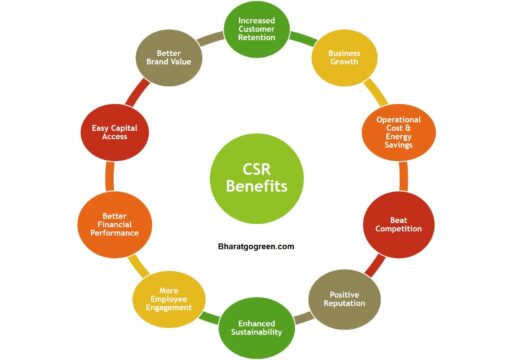Corporate social responsibility (CSR) is a business approach involving the concept of sustainable development to the corporate world.
It can drive a positive social & environmental change by defining the company’s accountability towards its customers, stakeholders, and society.
Earlier, the concept of corporate social responsibility is viewed in terms of charity or donations based on humanitarian grounds, but now the idea is totally changed.
CSR is now an effective business tool that integrates economic, environmental, and social objectives with the company’s operation and growth.
Every company has its own model of social responsibility program that not only increase business and revenue but also promote a positive change in the world.
In this article, we will discuss-
- What is corporate social responsibility?
- Purpose and benefits. Is it good or bad?
- Examples of CSR activities?
- Corporate Social responsibility in India
What is the meaning of Corporate Social Responsibility?

Corporate social responsibility means that a corporation/organization must act dutifully to protect the interests of its society and environment as a whole.
Earlier, the CSR activities were related to the benefit of corporate owners & their shareholders, but over time, the term stakeholders evolved.
The term stakeholders refer to all those on whom organization activities may have an impact, and the Corporate objectives and policies can influence them.
Examples of stakeholders include employees, suppliers, customers, and even the community from where business resources are drawn.
We can say that the basic idea of social responsibility relies on the concept of giving and take.
| The full form of CSR is Corporate Social Responsibility |
In order to run, an organization will take its resources (raw materials) from the community itself and they must return something to the society by doing various CSR activities.
Hope you are getting an idea!
To do successful business and survive in the long run, an organization must include the social & environmental objectives into their operations.
An organization has to manage the expectation of other stakeholders such as employees, suppliers, and society, along with satisfying its shareholders and customers’ demands.
What is the Purpose of CSR [Is it good or bad]

The purpose of CSR is to make an organization socially responsible so that it can create a positive impact on the environment, stakeholders, consumers, suppliers, employees, and all members of society.
So how an Organization can become socially responsible?
A company can become socially responsible by integrating various concerns such as social, environmental, ethical, consumer, law, and human rights into their business operations and core strategy.
CSR is good for an organization as this could increase competitiveness and provide a huge benefit in the long run.
A study done by Kenexa High performance institute states that the companies implementing CSR have a high level of employee engagement and better customer satisfaction as compared to non-CSR companies.
Corporate social responsibility (CSR) is applicable for any business regardless of their size or sector, and its implementation is important for any organization due to the following reasons:-
- Reduction in operating costs
- Potential Energy savings
- Capturing business leads
- Increased staff engagement
- Workforce retention
- Attaining Sustainability
- Positive publicity
- Leading Innovation
- Better Brand value
- Easy Capital Access and a lot more
What are Examples of CSR activities?
There are numerous CSR activities and initiatives for an organization, but they should not treat it merely as compliance.
An organization must support the social activities that could potentially benefit the environment & society.
Some of the common examples of CSR activities are:-
- Protection of Flora & fauna, Natural resources conservation, and maintaining the quality of soil, air, and water
- Animal welfare and maintaining the ecological balance
- Waste reduction & ensuring environmental sustainability
- Purchasing raw materials locally
- Corporate working conditions improvement
- Promoting preventive health care & sanitation
- Ensuring the availability of clean drinking water for all
- Contributing to educational and social programs
- Eco-friendly office and business travel policies
- Working with environmentally-conscious suppliers and distributors
- Promoting gender equality
- Uplifting socially & economically backward groups
- Fundraising programs for the community
- Contributing to Government funds for socio-economic development
- Development projects in rural areas
- Promoting vocation skills that enhance employment
- Providing healthcare facilities and low-cost medicines for society
- Carbon footprint reduction
- Implementing recycling programs
- Ethical trading
Corporate Social Responsibility in India
In India, the Ministry of Corporate Affairs regulates the CSR policies through the Companies Act, 1956, 2013 – clause 135.
This clause states that the CSR requirements are applicable to companies with a net worth of 500 crore INR, an annual turnover of 1,000 crore INR, and more, or a net profit of five crore INR and more.
It also specifies that companies have to set-up a CSR committee consisting of their board members having three or more directors, including at least one independent director.
Any organization meeting the above criteria have to spend 2% of their profits on CSR programs.
In 2019, KPMG conducted a CSR reporting survey for the Indian companies and compiled CSR data for the past five years (2014-19).
Following are some of their findings:
- 325 % increase in No. of companies disclosing details of outreach
- 30% of Companies having more than three CSR meetings
- 76% Companies spending 2% or more during the current year
- 220% Increase in expenditure towards reducing inequality at companies with ‘women as Chairperson of CSR committee’.
- 75% of CSR projects implemented through partnerships
You can read the full report here.
India is one of the fastest-growing economies, and due to limited resources, many problems, such as poverty, illiteracy, food scarcity, pollution, lack of healthcare, etc. are omnipresent.
Several areas require a contribution to social development where an organization can support them through various CSR activities.
In India, major organizations like BPCL, Reliance, Tata, Mahindra, Infosys, BHEL, ONGC, Maruti, etc. are actively doing CSR programs in various areas like health, education, skill development, rural area development, environmental management, and livelihood enhancement to name a few.
Conclusion
The concept of corporate social responsibility not only helps any business to grow, but it can make a positive impact on society and the environment too.
Irrespective of the size of an organization, CSR has many distinct advantages that can apply to any business or sector.
Many Indian organizations are implementing and managing the CSR policies effectively, but this concept is still in the nascent stage.
To make CSR more effective, there is a need to raise awareness among the public so that they could differentiate between philanthropy and social responsibility.
In the future, we believe that more NGOs and corporate houses would join the CSR programs and address the socio-economic issues in India effectively.
What do you think about the future of CSR in India?
Please provide your comments below and share this article to help others.
To join the Save Environment bandwagon consider subscribing bharatgogreen.
Reference:
- The Companies Act, 2013
- ISO 26000 — Social responsibility
- Tandon, Nidhi & Kaur, Simran. (2017). The Role of Corporate Social Responsibility in India. Research Journal of Commerce & Behavioural Science-RJCBS. 6. 29-34.
- Singh, Satinder & Sharma, Ashwarya. (2015). Corporate Social Responsibility Practices in India: Analysis of Public companies. 1. 33-44.
- Nitin Kumar, Corporate social responsibility: An analysis of impact and challenges in India, ISSN-2320-0073